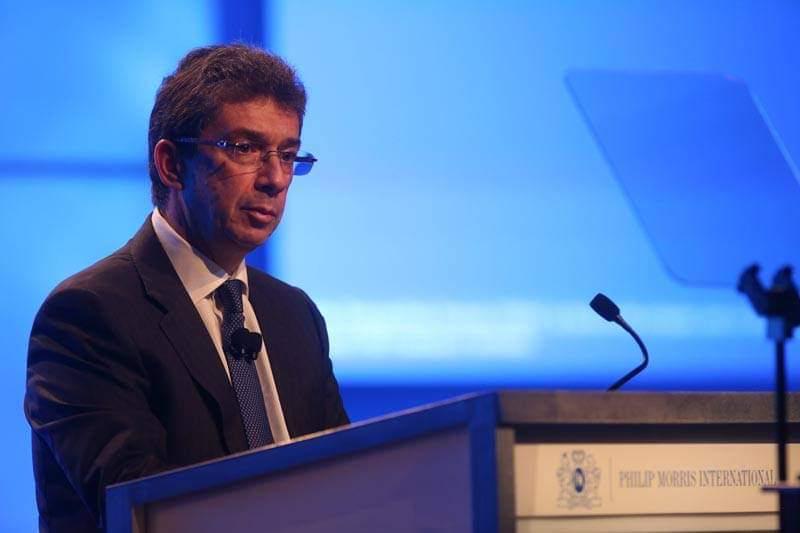
Philip Morris International CEO André Calantzopoulos believes that science, transparency, and the collaboration of governments, regulators, and the private sector are necessary to drive meaningful progress.
MANILA, Philippines — To drive progress and address global threats, such as the coronavirus disease (COVID-19) pandemic and climate change, Philip Morris International CEO André Calantzopoulos believes that science, transparency, and collaboration of governments, regulators, and the private sector are necessary.
Speaking in the “Conversations on Leadership” virtual panel discussion organized by The Wall Street Journal (WSJ) on September 29, 2020, Calantzopoulos said public and private sectors, on their own, cannot achieve significant change and must work together.
The online event was in line with the first virtual session of the United Nations General Assembly (UNGA). This year’s UNGA theme was “Reaffirming our collective commitment to multilateralism, confronting COVID-19 through effective multilateral action.” The panelists shared lessons learned from the pandemic and how the scientific community can better work with the public and private sectors to mitigate threats to global health in the future.
Noting the complex interdependency that underpins the planetary ecosystem and global economy, particularly the fragility of global supply chains, Calantzopoulos said the COVID-19 pandemic has shown that the slightest problem can derail the global economy.
He suggested that both the government and the private sector’s global supply chains should have redundancies such as inventories, as well as flexibility, which can facilitate business continuity.
He said the first and most important thing is to explain the facts to people about global problems such as climate change and the pandemic, “not demagogically, not based on politics, but based on facts.”
Referring to climate change, Calantzopoulos suggested to explain to people what it is and its implications, and then offer them alternatives to their current behavior which can help mitigate climate change.
“We also point out that fossil fuels per se are not the problem; it is the fact that we burn fossil fuels that creates the problem. This is the same approach we have in helping people move away from combustible cigarettes. First, we tell them that combustion is the problem in smoking. For smokers who don’t want or who are unable to quit smoking, we tell them about switching to non-combustible alternatives.”
Calantzopoulos also noted the value of science and technology to inform decision making. “We live in a world where politics dominates everything and the narrative supersedes the facts. Policymakers and legislators should have access to subject matter experts [who can] provide them with facts and data.”
He said governments, in collaboration with the private sector, must create the right regulatory environment. “You cannot just have a law and assume things will happen or just let companies [operate freely] and assume this will happen. I think we need a very interactive process between the public sector and the private sector. But we should not forget that the [real] decision-makers…are the consumers because they [are the ones who] have to change their behavior.”
Calantzopoulos said that private companies have two advantages, “They can innovate, especially with the right incentives. Second, they have access to consumers.”
The tobacco industry, Calantzopoulos said is highly regulated and rightfully so, adding that, “Our new non-combustible products are not risk-free and obviously must be regulated. But sometimes, as we see in the tech sector, regulation lags behind. The regulation needs to adapt.”
He said there needs to be a balance, “Never leave something completely unregulated, but don’t stifle innovation based on too much precaution or ideology. Otherwise, we will fall back to the precautionary principle that unless we test everything and we measure every impact, we should not proceed with innovation, which would stop any advancement in the world.”
Calantzopoulos also said that transparency drives innovation. Citing solar panels, he explained that they are manufactured using chemicals, which if not disposed of properly, can damage the environment. While not harm-free, solar panels can reduce the impact of climate change.
“We know that our product, cigarettes, has a negative impact on health. This is why we are developing non-combustible alternatives in line with our mission to create a smoke-free future,” he said.
PMI is leading a transformation in the tobacco industry to create a smoke-free future and ultimately replace cigarettes with smoke-free products to benefit adults who would otherwise continue to smoke.
Among the smoke-free products developed by PMI and already available in many markets around the world is IQOS, an electronic device that heats tobacco-filled sticks wrapped in paper, called HEETS or HeatSticks, to generate a nicotine-containing aerosol. IQOS heats specially designed tobacco units just enough to release a flavorful nicotine-containing tobacco vapor but without burning the tobacco. Because the tobacco is not burned, the levels of harmful chemicals produced by IQOS is significantly lower compared to combustible cigarette smoke. Around 11 million adult smokers around the world have already stopped smoking and switched to IQOS.

